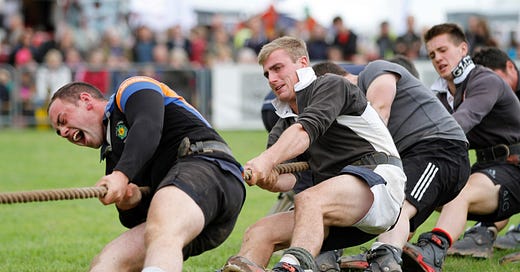The motives of anti-sweepstakes social casino operators are called into question.
Tribes, campaigners take aim at Kalshi.
One last dance: West Ham switch gambling shirt sponsors for last-gasp season.
Brazilian trade body brands proposed tax increase as “unacceptable.”
Your biggest tech problems. Solved.
Fincore delivers technical solutions for the Gaming industry. For over 25 years we’ve helped clients modernise legacy platforms, unblock roadmaps, integrate complex systems, and apply AI to real-world problems. We’ll help you shape the right strategy, and then we’ll roll up our sleeves and deliver it.
Our edge? A world class team with deep domain knowledge, armed with our highly customisable IP toolkit that adapts to your architecture, whether modernising legacy or starting from scratch. That means faster delivery, smoother integration and less risk.
What’s my motivation?
Competitive threat: A recent analyst note on Aristocrat from the team at Jefferies said that when it comes to the company’s social casino operation it “continues to withstand competitive headwinds,” notably from ongoing sweepstakes products.
The comment highlights the extent to which the moves to ban sweepstakes, or otherwise see them hounded out of states via regulatory cease-and-desist letters, benefits the largest social casino operators.
This includes the notable names of both Aristocrat and one of the leading agitators for the regulatory harassment of sweepstakes operators, Light & Wonder.
Legacy to protect: That is certainly the opinion of the Social and Promotional Games Association (SPGA), which told Compliance+More that “legacy companies have significant existing businesses to protect, and social casinos’ financial motivations clearly drive their opposition to sweepstakes models.”
“Arguments around taxation and offshore companies are hyperbolic and serve social casinos’ interests,” the SPGA spokesperson added.
Intensity: Analyst sources spoken to for this article who asked for their names to be withheld noted that sweepstake gaming’s negative impact on social casino was “overwhelmingly” in the specific area of user acquisition.
The source added that if two companies are bidding on the same spot on somebody’s Facebook wall, the one willing to spend more per new user will win the spot.
Nowadays, that has forced traditional social casino operators to rethink their user acquisition “because they’re losing the bidding war” to sweeps operators.
Can’t we all just get along? The irony in all this is that sweepstakes, social casino and, in states where it is allowed, iCasino can all thrive given the consumer propensity to play all three forms of gaming.
One analyst source suggested a huge number still also play traditional social casino games, and still play RNG when available.
“Slot fans simply like slots and each form has slightly different entertainment propositions,” the analyst added.
The state of play: As it stands, the anti-sweepstakes lobby has notched up wins in Montana and now Connecticut, where the legislatures have banned sweepstakes altogether. The latter saw Governor Ned Lamont approve the measure this week.
However, a similar measure in Louisiana was vetoed by the governor.
Meanwhile, a bill is currently being debated in New York while the attorney general has moved to send cease-and-desist letters to 26 operators.
Blind eye: The extent to which the sector’s lobbying resources have been dedicated to waging a war on sweepstakes has recently been bemoaned. Chris Grove from EKG suggested the OSB sector had been blindsided in Illinois in part because of the strategies of their “allies” in the failed attempt to press for anti-sweeps legislation.
The SPGA spokesperson noted the focus on sweepstakes had “diverted attention from opening up more iCasino states and meaningful regulatory discussions.”
Increase Operator Margins with EDGE Boost Today!
EDGE Boost is the first dedicated bank account for bettors.
Increase Cash Access: On/Offline with $250k/day debit limits
No Integration or Costs: Compatible today with all operators via VISA debit rails
Incremental Non-Gaming Revenue: Up to 1% operator rebate on transactions
Lower Costs: Increase debit throughput to reduce costs against ACH/Wallets
Eliminate Chargebacks and Disputes
Eliminate Debit Declines
Built-in Responsible Gaming tools
To learn more, contact Matthew Cullen, chief strategy officer on Matthew@edgemarkets.io
+More
Sweden: The gambling authority Spelinspektionen has moved to stop influencers from promoting illegal gambling on Twitch. A number of influencers are reported to have been placed under supervision within an ongoing initiative to curb illegal gambling marketing directed at Swedish audiences through digital platforms.
Also in Sweden, the government is reported to be considering a comprehensive ban on allowing the use of credit cards to gamble. Current regulations only ban credit gambling on point-of-sale transactions and only apply to credit offered by gaming operators and agents. The ban would prohibit operators from taking any bets made with a credit card.
ICE and a slice: US Rep. Michael Rulli from Ohio has introduced a bill that would use around $300m in funds from federal gambling taxes for a safety net for Immigration and Customs Enforcement. The bill is a long shot, however, given it would need Democrat votes to get through the Senate.
Macau: The sports-betting licensee Macau Slot has pledged to reduce its reliance on foreign labor after its concession contract expired last week, with the authorities determining the company must prioritize local employment. Talks are said to be continuing.
Philippines: Having seen the EU delist the Philippines from its list of countries with a high level of money laundering risk, the analysts at Moody’s have said the country’s authorities must maintain vigilance over “sectors such as online gaming and cryptocurrency.”
Ainsworth Game Technology said a corruption investigation into CEO Harald Neumann, linked to his former role at Novomatic, is expected to be dropped without any findings of wrongdoing. Austrian prosecutors are probing allegations that Neumann sought to influence a regulatory board appointment to favour Novomatic, but Ainsworth said authorities have already closed most lines of inquiry.
The Michigan Gaming Control Board has issued cease-and-desist letters to five unlicensed operators, including BoVegas, BUSR and Wager Attack Casino, for offering illegal online casino and sports betting. Executive director Henry Williams warned the state “will not tolerate unlicensed gambling operations” and vowed to shut down illegal platforms targeting residents.
Colombia’s Ministry of Finance will publish a new Tax Budget Proposal by the end of July aimed at reforming fiscal policy across key sectors, including online gambling. Ministers are considering an extension of the 19% VAT on online gambling deposits, originally introduced as a temporary measure under Decree 175 of 2025 but now backed for permanence by the attorney general.
Kalshi under fire
Here come the suits: Kalshi is bracing for a wave of legal action from Native American tribes and anti-harm campaigners claiming the prediction market operator offers illegal gambling.
A coalition led by Stop Predatory Gambling has filed the first amicus brief in the 3rd Circuit appeal over Kalshi’s sports event contracts, siding with New Jersey in its effort to overturn Kalshi’s preliminary injunction.
The anti-harm groups argue the case could set a nationwide precedent on whether state gambling laws can be bypassed via the Commodity Futures Trading Commission (CFTC) framework.
Gaming attorney Daniel Wallach shared excerpts from the brief, which warned a lower court failed to consider the “immense public harm” of allowing unregulated gambling products under the CFTC’s watch.
Included are arguments that Kalshi’s contracts constitute underage gambling, promote election betting in violation of state norms, and rest on a legal theory that “flies in the face of the public interest.”
Big guns: Separately, a second amicus brief is due Tuesday from a coalition of tribes. It goes to the undermining of the Indian Gaming Regulatory Act while pushing back on recent signals of support for Kalshi from CFTC quarters.
“Makes sense for the tribes to go this route following recent discouraging statements by Commissioners Pham and Quintenz,” Wallach said.
He noted the immediate point of entry via a previously filed case, and the more favorable environment of federal courts as being in the tribes’ favor.
Election betting scandal
Who knew: Fifteen individuals charged with using insider knowledge to bet on the UK’s 2024 general election date appeared in court last week.
Twelve, including senior Tory marketing chief Simon Chatfield, former chief data officer Nick Mason and candidate Laura Saunders, pleaded not guilty; three others entered no plea.
The UK Gambling Commission alleges the group used confidential information to gain an unfair advantage, a criminal offence under the Gambling Act 2005.
All 15 are due to reappear at Southwark Crown Court on 11 July.
Last gasp
If I had a hammer: English Premier League soccer club West Ham has raised the ire of the UK’s anti-gambling lobbyists by reportedly moving to replace current shirt sponsor Betway with BoyleSports, just one year ahead of the voluntary ban on such advertising that comes into effect for the 2026-27 season.
The deal, which the Mail Online said is worth £12m, was criticized by the Coalition to End Gambling Ads, which accused teams like West Ham of having “lost their moral compass.”
Indicted: Pointing to the ongoing investigation of West Ham’s Brazilian midfielder Lucas Paquetá over alleged breaches of the rules on betting, the Coalition spokesperson told the Mail it was a “sorry indictment” of football that the club was enabled to do a sponsorship deal while a cloud hangs over the player.
“That the club, despite this background, is replacing one gambling sponsor with another shows that they have not learned anything and are still putting corporate greed above the interest of fans,” the Coalition’s spokesperson continued.
He added that this was “no doubt” a “last throw of the dice” given the incoming rules.
Weaned away: Recall, the Premier League agreed to voluntarily withdraw gambling sponsorship from the front of clubs’ matchday shirts back in April 2023. The clubs were given three years’ grace to “assist with their transition” away from gambling.
Asian contagion: Separately, the UK Gambling Commission has recently warned soccer clubs over their links with many Asian-facing betting brands in the wake of white-label provider TGP Europe surrendering its license.
As has become evident, while a license was needed for UK-facing operations, it is entirely within the current rules for an offshore brand to promote itself via soccer club sponsorships as long as they don’t accept any UK play.
The Commission said at the time that clubs would be “asked to demonstrate that they have assurance that any steps to geo-block the sites are effective.”
Player Protection, Not Player Prevention
Safer gambling is now a major focus for operators and investors, vital for industry sustainability. Mindway AI’s award-winning software uses neuroscience, AI, and expert assessments to exceed player protection requirements. GameScanner offers automated, early detection of at-risk gambling, allowing timely intervention. Make your player base safer and your business more sustainable and investible.
Learn more at mindway.ai
Unacceptable
Up with this I will not put: The Brazilian Institute of Responsible Gaming or IBJR has branded the government’s proposed tax increase from 12% to 18% as “unacceptable” and claims it makes the market “unviable, creates legal uncertainty and threatens public revenue.”
The body, which represents 13 top operators and half-a-dozen suppliers, said the tax changes would undermine the stability of a regime that has been in operation for barely six months.
The statement added it may consider legal action if the proposed tax changes are implemented.
Fuel/fire: The IBJR went on to warn that higher taxes in the regulated market would further fuel the offshore market on the basis that operators would be unable to compete on price.
“By encouraging the parallel market, the government undermines its own revenue, loses control over sports integrity and facilitates money laundering,” the statement continued.
Half-cocked: Separately, the IBJR released a study showing the illegal market now accounted for over half the total Brazilian online market.
The claim comes from a study undertaken on the IBJR’s behalf by a consulting firm called LCA and which itself was based on a survey of consumer behavior.
It found that between 41% and 51% of the market was now offshore and 73% of bettors have used an illegal site this year.
It added that 78% find it difficult to distinguish between legal and illegal sites.
Calendar
Jun 19: Player protection symposium, CGS Toronto
Jun 26: Gaming in Spain, Madrid
Jul 1: Technology in Gaming, London
Jul 14-16: OIGA, Oklahoma City
GuardDog, powered by Underdog, is a pioneering investment fund dedicated to fostering innovation in responsible gaming.
GuardDog supports and accelerates early-stage startups focused on building new and creative solutions to address problem gaming and further responsible gaming.
Ready to be one of the underdogs of responsible gaming?
Visit to apply: https://underdogfantasy.com/guarddog
An +More Media publication.
For sponsorship inquiries email scott@andmore.media.











Fwiw, in the many states that collect sales tax on "digital services", social games operators pay a markedly higher % of revenue as sales taxes than licensed operators do as gaming taxes. (Social games revenue is roughly equivalent to licensed gaming "GGR".)
And yes, "social games operators" includes so-called "sweeps casinos," which are just social games operators that happen to use promotional games to stimulate social games sales, same as McDonald's uses its promotional game McDonald's Monopoly to stimulate food and beverage sales.